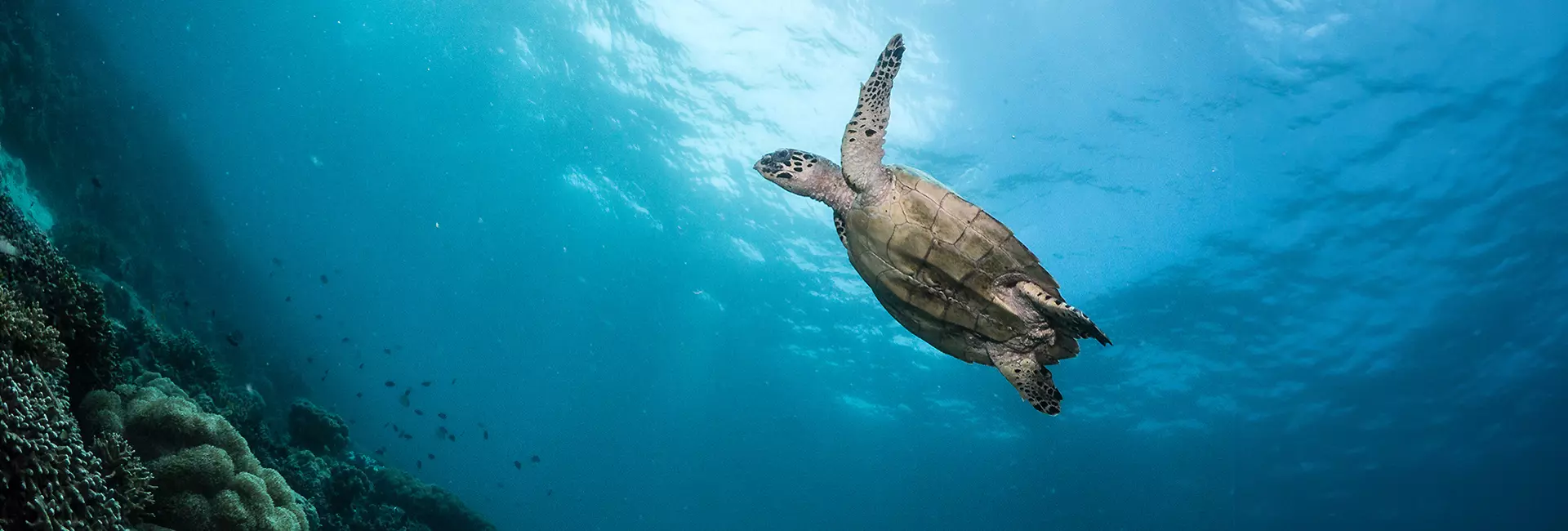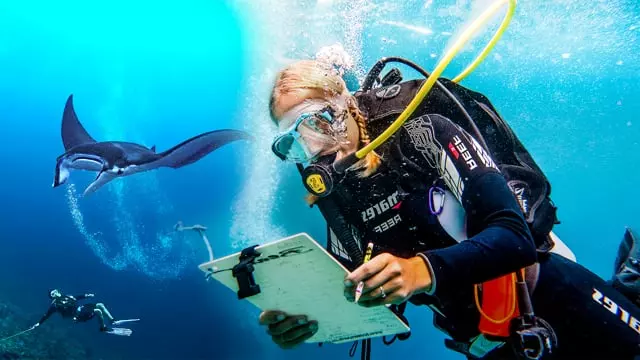
Marine Wildlife
Marine Conservation Volunteering
The ocean is our planet's lifeblood and is home to extraordinary creatures, vast ecosystems, and mysteries yet to be uncovered. Despite its importance, it's in crisis; coral reefs are vanishing, marine species are being pushed to the brink, and plastic pollution chokes once-thriving waters. The need for action has never been more urgent.
At The Great Projects, we offer exciting worldwide marine conservation volunteer opportunities, giving you a chance to make a real impact while experiencing extraordinary, bucket-list-worthy moments. Imagine whale watching in the Azores, cage diving in South Africa, or releasing baby sea turtles in Sri Lanka and Costa Rica. Alternatively, take the plunge as a marine volunteer on one of our diving conservation projects in Indonesia, Malaysia, Mozambique, and Belize, where you'll engage in marine research, coral reef restoration, community outreach, and even invasive species removal. As a marine conservation volunteer, you'll be at the forefront of ocean protection, helping collect vital data shaping global marine conservation efforts. This isn't just about protecting marine life; it's about preserving the future of our planet.

Projects Do More
7 - 84 Nights from $869.00
Take part on The Great Turtle Project in Sri Lanka as a volunteer in a turtle sanctuary and have an impact on the conservation of the country's beautiful sea turtles.
View project14 - 84 Nights from $1,244.00
Come face to face with one of the world’s most misunderstood predators whilst aiding great white shark conservation.
View project14 - 84 Nights from $1,869.00
Dive unexplored reefs and partake in marine conservation projects amongst the islands of the beautiful Raja Ampat archipelago.
View project6 - 55 Nights from $869.00
Dive into the incredible waters of the Perhentian Islands and aid marine conservation by volunteering in Malaysia!
View project6 - 55 Nights from $869.00
Help to assist a team of marine biologists in important whale and dolphin conservation.
View project27 Nights from $2,119.00
Join this unique whale shark internship project on the stunning Mafia Island in Tanzania.
View project13 - 83 Nights from $2,374.00
Work towards integral marine conservation in one of the most marine-rich locations on Earth.
View project7 - 84 Nights from $994.00
Play your part in the conservation of Olive Ridley turtles, as well as other vulnerable and endangered wildlife species, in coastal Costa Rica.
View project4 - 53 Nights from $1,369.00
Dive in paradise, help preserve the Belize Barrier Reef, and enjoy private island life!
View project15 - 85 Nights from $1,994.00
Experience real field research, coming face-to-face with a multitude of marine life while helping to protect a biodiverse marine paradise, including a coastal complex and wetland of international importance, home to The Bar Reef!
View projectOn the Blog
Marine Life Information
Marine Wildlife At A Glance
Endangered Status
Dependent On Species
Number remaining in the wild
Dependent On Species
Endemic Region
Oceans Worldwide
As of 2022, the IUCN Red List states over 1,550 of the 17,903 marine species assessed are threatened with extinction.
Vaquitas, hawksbill sea turtles, Kemp's ridley sea turtles, North Atlantic right whales, African penguins, and oceanic whitetip sharks are among the most endangered marine wildlife, classified as critically endangered on the IUCN Red List. Other endangered marine wildlife include blue whales, hammerhead sharks, leatherback sea turtles, whale sharks, and oceanic manta rays.
Less than 3% of the global ocean is free from human pressures, which is why marine conservation is critical. Marine conservation volunteering is a way to actively contribute to protecting ocean ecosystems by participating in research, habitat restoration, and species monitoring efforts.
Marine wildlife faces numerous threats, many of which are caused by human activities. Some of the biggest dangers include:
- Climate Change: Ocean warming disrupts marine ecosystems, causing species to migrate and coral reefs to bleach. Sea level rise affects coastal habitats like mangroves and salt marshes. Ocean acidification (caused by CO₂ absorption) weakens the shells of marine organisms like corals, molluscs, and plankton.
- Pollution: Millions of marine animals, including turtles, seabirds, and whales, ingest or become entangled in plastic pollution. Toxic oil spills can suffocate marine life, damage ecosystems, and poison food chains. Industrial and agricultural runoff introduces heavy metals, pesticides, and other chemical pollution into the ocean. Noise pollution from ship traffic, oil drilling, and sonar disrupt communication and navigation for whales, dolphins, and other marine life.
- Overfishing & Bycatch: Overfishing depletes fish populations, throwing marine ecosystems out of balance. Bycatch (unintentional capture of non-target species) harms dolphins, sea turtles, and seabirds caught in fishing nets.
- Habitat Destruction: Coastal development destroys important breeding grounds like mangroves, seagrass beds, and coral reefs. Bottom trawling (dragging nets along the seafloor) damages sea beds and disrupts entire ecosystems.
- Invasive Species: Ships and human activities introduce non-native species that compete with native marine life for food and habitat, sometimes leading to extinctions.
- Illegal Wildlife Trade: Marine species like sharks, sea turtles, and corals are poached for food, souvenirs, or traditional medicine, reducing populations and disrupting ecosystems.
- Dead Zones (Oxygen Depletion): Excess nutrients (from fertilizers and sewage) create algal blooms that deplete oxygen levels, suffocating marine life in "dead zones."
- Coral Reef Decline: Coral reefs, which support vast marine biodiversity, are being destroyed by warming waters, pollution, and destructive fishing practices.
Marine conservation efforts are crucial in mitigating these threats, and becoming a marine conservation volunteer allows individuals to actively participate in protecting marine ecosystems and the fascinating marine life that lives within them.
Marine conservation is essential for protecting biodiversity, regulating climate, sustaining fisheries, and supporting coastal economies. Oceans produce most of the Earth's oxygen, absorb carbon dioxide, and serve as a vital food source for millions.
Without conservation efforts, overfishing, pollution, and habitat destruction threaten marine and human life. Marine conservation volunteering allows individuals to actively support initiatives that minimise human impact on marine wildlife and their ecosystems.
You can get involved as a marine conservation volunteer, where beach cleanups, marine wildlife monitoring, coral restoration, shark tagging, turtle release and more could be part of your itinerary! Other ways to support marine conservation include advocacy, education, donating and fundraising efforts, reducing your plastic footprint, supporting sustainable seafood, or spreading awareness - even small actions make a difference in protecting our oceans.














